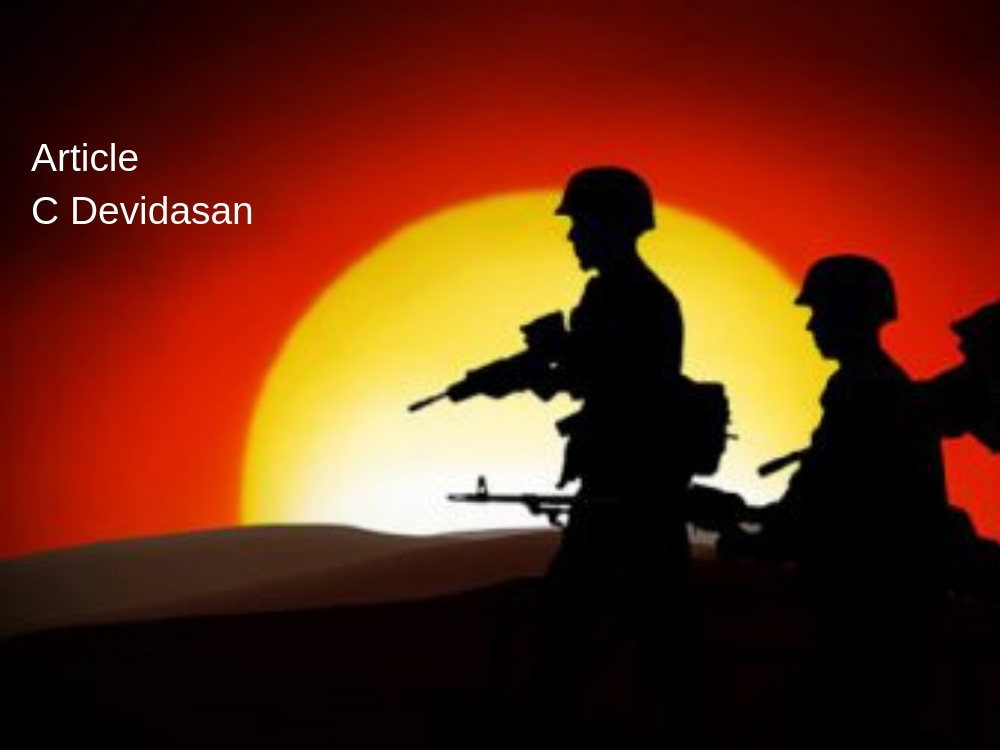

The armed forces of India are among one of the finest and largest in the world, which employ more than approximately 1.2 million personnel on active service and maintain approximately 2.1 million veterans. In order to keep a youthful profile of the forces, almost 60,000–65,000 personnel hang their uniform each year, at a very early age of late thirties or early forties. Such personnel who are released from the armed forces join ex-servicemen (ESM) fraternity after completing mandatory service conditions and continue to grow in numbers with each passing year. In contrast, the retirement age for other employees of the government, is fixed at around 58–60 or even 65 years in some categories.
A significant amount of national resources in terms of taxpayer’s money, infrastructure, human capital and other resources are utilised in the process of selection, recruitment, training, operations and maintenance, involving personnel of the defence forces. Ex-servicemen constitute a young, well-trained, highly disciplined, experienced and versatile pool of human resource and it becomes the responsibility of the nation to effectively provide the required resettlement opportunity to them and utilise them in nation building.
Resettlement of ex-servicemen of Armed forces (ie army, navy, and air force) in India is an important management function of the resettlement framework, which includes the Central government, State governments, Armed forces departments, war widows, dependents, ex-servicemen etc. The resettlement network rolls out number of services to ex-servicemen and their families however, the existing system needs to ensure inclusive management of the resettlement facilities and to continuously evaluate and improve on a regular basis. The present resettlement environment needs to be revamped for improving the sagging satisfaction of ex-servicemen with the resettlement services.
Resettlement as a process involves entire process of moving from Armed Forces service conditions to new living environment and seeking a fresh career after investing a major part of one’s productive life to a primary employment in the service of the nation. Resettlement is not necessitated due to an individual’s own choice, but due to the terms of the service rendered to the country, in the Armed Forces.
At the individual level, since the age of an ex-serviceman is in the late 30s or early 40s when released from service, he still has major responsibilities towards his family in the form of education and marriage of children along with other social responsibilities. The privileges and facilities made available while in their uniformed service are partially or no more available post retirement. On one hand, the ex-servicemen needs to fulfil major personal family responsibilities, and on the other hand, they have limited resources available, which complicates their retired life at a such an early age. In consideration of all these aspects, the significance of providing satisfactory services to the ex-servicemen for their resettlement assumes greater magnitude. There is an additional factor to be understood that the resettlement needs to be provided near the home as the displacements during the former service takes detrimental effect on the relations, education of children and maintenance of assets. These needs to be addressed in addition to providing for the shortage of resources due to retirement.
Facilities for Resettlement of Ex-Servicemen in India
The Central and State governments in India extend number of facilities in the process of resettlement of ex-servicemen. These facilities range from statutory provisions, assistance in finding suitable employment, medical facilities and welfare for the families of ex-servicemen.
- Kendriya Sainik Board: Zila Sainik Kalyan Karyalaya (ZSKKs), functioning under Kendriya Sainik Board through Rajya Sainik Vibhag at state level, have been established in most of the districts and function at the grassroots, in the resettlement of ex-servicemen at the district level. These Kalyan Karyalayas are the contact points for the ex-servicemen immediately after their release from the armed forces for their remaining life. The ZSKKs undertake registration for census and employment of ex-servicemen and also extend assistance to ex-servicemen and their families through government welfare schemes eg. children educational allowance, marriage allowances, funeral allowance etc and help required for pension related issues or administration related problems.
- Veteran Cell: All sub areas Head Quarters across the Indian Army have designated a Veteran Cell to coordinate the welfare of ex-servicemen, through the service channel, in their Area of Responsibility. They also provide liaison between Directorate of Indian Army Veterans (DIAV) and Sainik Kalyan Vibhag of respective states.
- Pension Disbursement: Pension is disbursed to ex-servicemen by the Government of India mostly through public and private sector nationalised banks. Receipt of monthly pension is an essential means of sustenance for majority of ex-servicemen and their dependents. Correct and timely disbursement is an essential duty of resettlement framework.
- Wives Welfare Association: The respective WWAs provide various financial and non-financial assistance to the families of both serving personnel and ex-servicemen. The WWA are organised at three levels viz. the central, regional and local formation levels and help maintain the formal and informal interaction between the ladies of the ex-servicemen and the appointments of Wives Welfare Association.
- Ex-Servicemen Contributory Health Scheme (ECHS): The ECHS is a contributory health scheme for ex-servicemen and their dependents. Under this scheme, ex-servicemen can avail of cashless medical facilities through ECHS polyclinics, defence hospitals and empanelled civil hospitals across the country. This is a major medical support necessitated by ex-servicemen for exhausting their bodies for working under beyond normal working conditions for extended period during their service duration.
- State Ex-Servicemen Corporation: Few states have constituted Ex-servicemen Corporations to secure jobs for ex-servicemen within the state with defined policies and resources. But these corporations do not have statutory powers to enforce agencies with providing employment on percentage basis, to the ex-servicemen. These corporations again are mostly managed by bureaucratic authorities hence lack understanding and affinity towards ex-servicemen function and are only doing an additional function.
- Welfare Placement Cells: Self sustaining placement cells of respective services work to provide a crucial link between the ex-servicemen and prospective employers in the civil sector. The placement cell is organised at central and regional levels and register ex-servicemen and prospective employers to meet the requirements. These cells disseminate information on job opportunities through various platforms and regularly organise placement related events to make ex-servicemen and prospective employers meet each other.
- Education Facilities: Kendriya Vidyalayas are operated by Kendriya Vidyalaya Sangathan under the Government of India to provide uniform curriculum and regulations throughout the country to overcome the changes due to constant transfers during service across the country. As most of the ex-servicemen have school going children at the time of their release from the Services, Kendriya Vidyalayas are most viable solution for continuing education of their children for a smooth transition. To supplement, Indian Army has established Army Welfare Education Society (AWES) as a registered society to provide good quality education to the children of serving and ex-servicemen both in terms of school and college or professional education. This compensates for the lack of facilities faced by children due to truncated postings in far flung and inaccessible areas where even the Kendriya Vidyalayas do not exist. The society runs Army Public School at number of stations and various professional colleges like Medical, Engineering, Management etc.
- Government Departments: Ex-servicemen need to approach number of departments of both the Central and State governments in the process of their resettlement to avail various concessions extended by the governments. These concessions range from allotment of waste land, exemption or subsidy of fees, reservations in colleges for children of ex-servicemen etc. As part of resettlement the job vacancies earmarked for ex-servicemen are managed through Government employment exchanges, organised at the district level.
Ideally, the personnel of the armed forces should not be left to fend for themselves in resettlement. It is the responsibility of the government to reorient and provide the veterans with a compatible job in changed environment when they are due for release from the armed forces, to enable them to look after themselves and their families in a respectable manner after rendering such honourable duty in the service of nation. At the national level, effective resettlement of ex-servicemen is mandatory to keep up the morale of the serving members of the defence forces. If the resettlement of veterans is neglected, then the talented youth of the nation will have no motivation to join the armed forces.
Regular studies need to be conducted to assimilate the ever growing needs of ex-servicemen. Resettlement of ex-servicemen is a complex socio-economic process therefore, collective efforts by all stakeholders in resettlement that include the Central and State governments, the Defence agencies/ departments, the private sector, voluntary associations and the ex-servicemen and their dependents should aggressively participate in the improving the entire process. The planning parameters must be based on inclusive growth strategies with coordinated efforts by all those concerned with the resettlement of veterans. Such strategies will strengthen the morale of both veterans and the serving personnel (the future veterans). Ultimately this is expected to attract better talent among the young citizens into the armed forces and eventually to the civil sector, thereby benefitting the country.
